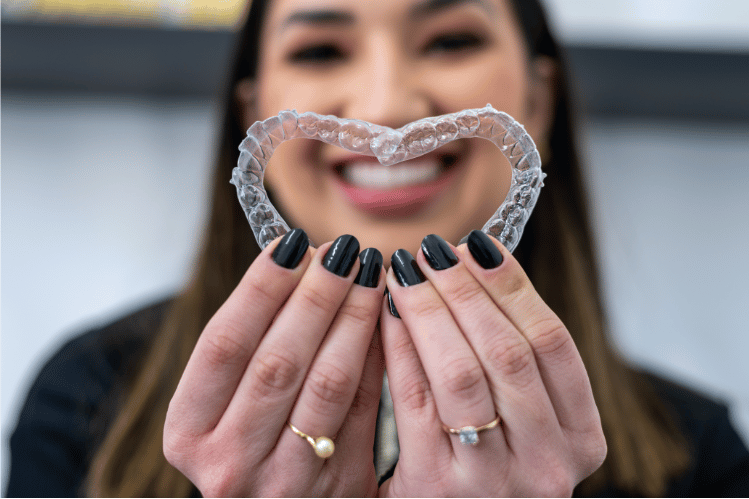
Table of Contents
Introduction
Smile – it's the first universal language of kindness. And who wouldn't want their kindness to shine brightly, showcasing healthy, white teeth? When we think about achieving that dazzling, bright smile, the narrative usually revolves around brushing twice a day, flossing daily, and regular dental check-ups. However, an aspect often overlooked is the role diet plays in the color of our teeth.
What we eat and drink can have a significant impact, with some foods naturally whitening teeth while others cause them to stain. Today, let's explore the foods that stain and whiten your teeth.
Foods That Whiten Teeth

- Crunchy Fruits and Vegetables: Fruits and vegetables are the natural toothbrushes provided by nature. Crunchy produce like apples, celery, carrots, and cucumbers serve dual purposes. Firstly, their high water content helps to stimulate saliva production. Saliva is your mouth's natural cleaning agent that helps wash away food particles. Secondly, the abrasive texture of these fruits and vegetables can scrub your teeth as you chew, helping to remove surface stains.
- Recycled and Eco-Friendly Brackets and Wires: Orthodontic brackets and wires can be made from recycled metals, reducing the need for excessive mining and extraction. Furthermore, using eco-friendly materials in the manufacturing process minimizes waste and promotes a circular economy.
Dairy Products:
For those who love cheese, milk, and yogurt, here's another reason to continue enjoying them. Dairy products, rich in lactic acid and calcium, play a significant role in teeth strengthening and whitening. Calcium helps fortify the teeth against decay, keeping them healthy and white. Furthermore, the texture of harder cheese helps remove food particles and surface stains.
- Strawberries: Despite their vibrant red color, strawberries have a surprising benefit: they help to maintain a white smile. They contain an enzyme called malic acid, a natural substance that helps remove surface discoloration. However, given their sugar content, always ensure you brush your teeth after enjoying strawberries to prevent cavities.
- Pineapple: Pineapple is the only food naturally containing bromelain, a compound recognized for its anti-inflammatory and cleansing properties. Bromelain also contributes to plaque removal, which, if left untreated, can discolor teeth.
Foods That Stain Teeth

While some foods and drinks contribute to a whiter smile, others can cause staining and discoloration. Moderation in consumption is key, and be sure to maintain good oral care habits after indulging in these:
- Coffee and Tea: Many people enjoy a hot cup of coffee or tea as part of their daily routine, but both contain tannins - substances that can cause staining and discoloration over time. To mitigate this effect, consider adding some milk, which not only lightens the color of your drink but also contributes tooth-strengthening calcium.
- Red Wine: Although a glass of red wine is often associated with health benefits, it's also a well-known source of teeth stains. The deep, rich color from grapes can stick to the enamel of your teeth, causing them to discolor over time.
- Berries: Berries, while packed with antioxidants and other health benefits, also carry vibrant colors that can stain your teeth. After enjoying a serving of berries, it is beneficial to rinse your mouth with water and brush your teeth if possible.
- Cola and Sports Drinks: Cola and sports drinks are high in sugar and have a low pH level, meaning they are highly acidic. This acidity can erode the tooth enamel, opening the door for stains.
- Soy Sauce and Balsamic Vinegar: Dark condiments like soy sauce and balsamic vinegar can cause tooth discoloration due to their strong color pigmentation. Regular use may lead to staining, so use them sparingly.
Conclusion
Maintaining a bright, beautiful smile is more than just avoiding foods that stain your teeth; it's about incorporating teeth-whitening foods into your diet, too. Moreover, it's essential to uphold good oral hygiene practices like brushing, flossing, and regular dental check-ups.
Another helpful tip is to drink plenty of water, especially after consuming foods or beverages known to stain teeth. This practice can help wash away the compounds that lead to discoloration. Of course, smoking, a notorious cause of tooth discoloration and oral health problems, should be avoided.
Remember, your diet plays a significant role in the health and appearance of your smile. By making mindful choices and maintaining good oral care habits, your smile can stay bright and beautiful for years to come. After all, a healthy, radiant smile is always in style.
Join thousands of happy customers who've transformed their smiles with AlignerCo. Click here to get started on your personalized plan.
FAQs
Can diet really affect the color of my teeth?
Yes, diet can significantly affect the color of your teeth. Some foods and drinks can stain your teeth, while others can help maintain their whiteness.
What are some foods that can whiten my teeth?
Foods that can naturally whiten your teeth include crunchy fruits and vegetables like apples and carrots, dairy products such as cheese and milk, strawberries, and pineapple. These foods have properties that promote saliva production, remove surface stains, or contain enzymes that contribute to plaque removal.
What are some foods and drinks that can stain my teeth?
Foods and drinks that can cause teeth staining include coffee and tea, red wine, berries, cola and sports drinks, and dark condiments like soy sauce and balsamic vinegar. These contain tannins, acids, or strong pigments that can stick to your teeth and cause discoloration over time.
I love coffee. Do I have to give it up to maintain white teeth?
Not necessarily. While coffee can stain teeth over time due to its tannin content, you can mitigate this effect by adding some milk to your coffee, which not only lightens the color of your drink but also contributes tooth-strengthening calcium. Also, drinking water after having coffee can help rinse away compounds that lead to discoloration.
Is there a way to reduce staining from red wine?
Red wine can stain teeth due to its deep, rich color. You can reduce its staining effect by drinking water alongside or after your wine, which helps rinse away compounds that could stain your teeth. Additionally, brushing your teeth about 30 minutes after consumption can help reduce potential stains.
How else can I maintain a bright smile apart from diet?
In addition to a balanced diet, good oral hygiene practices are essential in maintaining a bright smile. These include brushing your teeth twice a day, flossing daily, and getting regular dental check-ups. It's also beneficial to drink plenty of water, especially after consuming foods or beverages known to stain teeth, and to avoid smoking, which is notorious for causing tooth discoloration and other oral health problems.




